小学形容词的比较级和最高级
小学重要知识点归纳形容词比较级和最高级的陈述句和疑问句的学习与应用

小学重要知识点归纳形容词比较级和最高级的陈述句和疑问句的学习与应用形容词是描述事物性质、特征的词语,它在句子中通常用来修饰名词或代词。
其中,比较级和最高级是形容词变化的两种形式,用来比较不同事物的性质或特征的程度高低。
学好比较级和最高级的陈述句和疑问句的用法,对小学生的语言表达能力的培养非常重要。
本文将归纳形容词比较级和最高级在陈述句和疑问句中的学习与应用,并提供相应的例句。
一、形容词比较级的陈述句形容词比较级用于比较两个事物之间的差异,表示一个事物比另一个事物的性质或特征更高或更低。
形容词比较级的结构是“原形+ -er”。
1. 形容词比较级的基本结构形容词比较级的基本结构为“原形+ -er”,例如:- Tom is taller than John.(汤姆比约翰个子高。
)- Alice is younger than Mary.(艾丽斯比玛丽小。
)2. 形容词比较级的变化规则形容词比较级变化规则如下:- 单音节词和少数双音节词,在词尾加上“-er”;- 以字母“e”结尾的词,在词尾直接加上“-r”;- 以辅音字母+y结尾的词,变“y”为“i”,再加上“-er”;- 多音节词和部分双音节词,在前面加上“more”,例如:- happy → happier(快乐→ 更快乐)- easy → easier(容易→ 更容易)- beautiful → more beautiful(美丽→ 更美丽)3. 形容词比较级的应用形容词比较级的应用不仅仅是描述人或物之间的差异,还可以用于描绘其他方面,如时间、地点等。
例如:- The second book is more interesting than the first one.(第二本书比第一本更有趣。
)- The library is nearer to my home than the supermarket.(图书馆离我家比超市更近。
)二、形容词最高级的陈述句形容词最高级用于描述同一类事物中性质或特征的最高程度。
期末英语必考!形容词的比较级和最高级知识点汇总

期末英语必考!形容词的比较级和最高级知识点汇总变化规则大多数形容词和副词有比较级和最高级的变化,即原级、比较级和最高级,用来表示事物的等级差别。
原级即形容词的原形,比较级和最高级有规则变化和不规则变化两种。
(1)单音节词加词尾-er,-est来构成比较级和最高级。
tall(高的) taller tallestgreat(巨大的) greater greatest(2)以不发音的e结尾的单音节词只加-r,-stnice(好的) nicer nicestlarge(大的) larger largestable(有能力的) abler ablest(3)以一个辅音字母结尾的闭音节单音节词,双写结尾的辅音字母,再加-er,-estbig(大的) bigger biggesthot热的) hotter hottestred红色的 redder reddest(4)'以辅音字母+y'结尾的双音节词,改y为i,再加-er,-esteasy(容易的) easier easiestbusy(忙的) busier busiest(5)以ly结尾的副词,除early-earlier-earliest,其他都是加more most.Slowly-more slowly-most slowlyBravely-more bravely-most bravelyquickly-more quickly-most quickly(6)少数以-er,-ow结尾的双音节词未尾加-er,-estclever(聪明的) cleverer cleverestnarrow(窄的) narrower narrowest(7)其他双音节词和多音节词在前面加more,most来构成比较级和最高级。
如:important(重要的) more important most importanteasily(容易地) more easily most easily(8)一些词的比较级和最高级,可以加-er或 -est,也可以加more 或most如:clever, polite等。
29、小学英语语法比较级 & 最高级
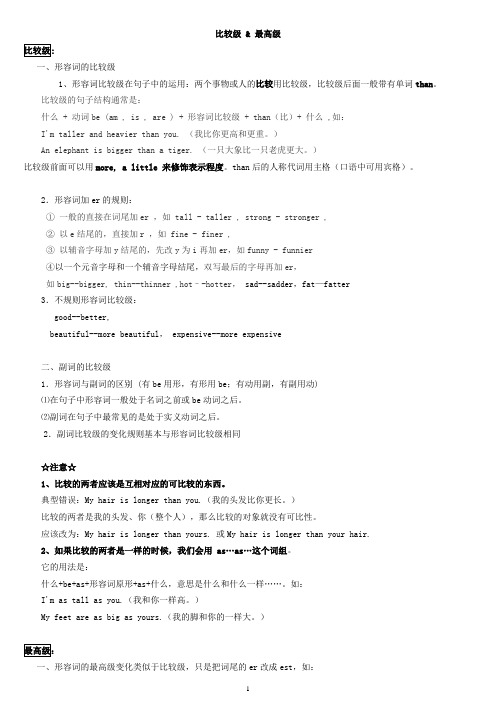
比较级 & 最高级一、形容词的比较级1、形容词比较级在句子中的运用:两个事物或人的比较用比较级,比较级后面一般带有单词than。
比较级的句子结构通常是:什么 + 动词be (am , is , are ) + 形容词比较级 + than(比)+ 什么 ,如:I'm taller and heavier than you. (我比你更高和更重。
)An elephant is bigger than a tiger. (一只大象比一只老虎更大。
)比较级前面可以用more, a little 来修饰表示程度。
than后的人称代词用主格(口语中可用宾格)。
2.形容词加er的规则:① 一般的直接在词尾加er ,如 tall - taller , strong - stronger ,② 以e结尾的,直接加r ,如 fine - finer ,③ 以辅音字母加y结尾的,先改y为i再加er,如funny - funnier④以一个元音字母和一个辅音字母结尾,双写最后的字母再加er,如big--bigger, thin--thinner ,hot–-hotter, sad--sadder,fat—fatter3.不规则形容词比较级:good--better,beautiful--more beautiful, expensive--more expensive二、副词的比较级1.形容词与副词的区别 (有be用形,有形用be;有动用副,有副用动)⑴在句子中形容词一般处于名词之前或be动词之后。
⑵副词在句子中最常见的是处于实义动词之后。
2.副词比较级的变化规则基本与形容词比较级相同☆注意☆1、比较的两者应该是互相对应的可比较的东西。
典型错误:My hair is longer than you.(我的头发比你更长。
)比较的两者是我的头发、你(整个人),那么比较的对象就没有可比性。
应该改为:My hair is longer than yours. 或My hair is longer than your hair.2、如果比较的两者是一样的时候,我们会用as…as…这个词组。
小学英语常见形容词及比较级、最高级变化一览表(汇编)
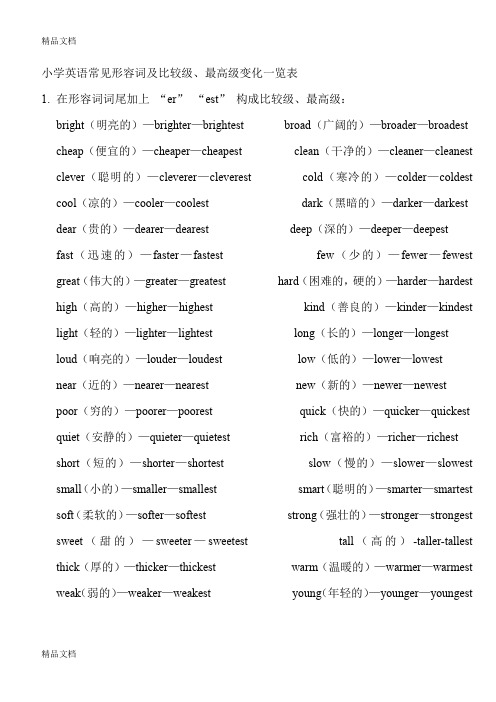
小学英语常见形容词及比较级、最高级变化一览表1.在形容词词尾加上“er”“est”构成比较级、最高级:bright(明亮的)—brighter—brightest broad(广阔的)—broader—broadest cheap(便宜的)—cheaper—cheapest clean(干净的)—cleaner—cleanest clever(聪明的)—cleverer—cleverest cold(寒冷的)—colder—coldest cool(凉的)—cooler—coolest dark(黑暗的)—darker—darkest dear(贵的)—dearer—dearest deep(深的)—deeper—deepest fast(迅速的)—faster—fastest few(少的)—fewer—fewest great(伟大的)—greater—greatest hard(困难的,硬的)—harder—hardest high(高的)—higher—highest kind(善良的)—kinder—kindest light(轻的)—lighter—lightest long(长的)—longer—longest loud(响亮的)—louder—loudest low(低的)—lower—lowestnear(近的)—nearer—nearest new(新的)—newer—newest poor(穷的)—poorer—poorest quick(快的)—quicker—quickest quiet(安静的)—quieter—quietest rich(富裕的)—richer—richest short(短的)—shorter—shortest slow(慢的)—slower—slowest small(小的)—smaller—smallest smart(聪明的)—smarter—smartest soft(柔软的)—softer—softest strong(强壮的)—stronger—strongest sweet(甜的)—sweeter—sweetest tall(高的)-taller-tallest thick(厚的)—thicker—thickest warm(温暖的)—warmer—warmest weak(弱的)—weaker—weakest young(年轻的)—younger—youngest2.双写最后一个字母,再加上“er”“est”构成比较级、最高级:big(大的)—bigger—biggest fat(胖的)—fatter—fattesthot(热的)—hotter—hottest red(红的)—redder—reddestsad(伤心的)—sadder—saddest thin(瘦的)—thinner—thinnestwet(湿的)—wetter—wettest mad(疯的)—madder—maddest3.以不发音的字母e结尾的形容词,加上“r”“st”构成比较级、最高级:able(能干的)—abler—ablest brave(勇敢的)—braver—bravest close(接近的)—closer—closest fine(好的,完美的)—finer—finest large(巨大的)—larger—largest late(迟的)—later—latest nice(好的)—nicer—nicest ripe(成熟的)—riper—ripest rude(粗鲁的)—ruder—rudest safe(安全的)—safer—safest strange(奇怪的)—stranger—strangest wide(宽广的)—wider—widest wise(睿智的,聪明的)—wiser—wisest white(白的)—whiter—whitest4.以字母y结尾的形容词,把y改为i,再加上“er”“est”构成比较级、最高级:busy(忙碌的)—busier—busiest dirty(脏的)—dirtier—dirtiest dry(干燥的)—drier—driest early(早的)—earlier—earliest easy(容易的)—easier—easiest friendly(友好的)—friendlier—friendliest funny(好玩的)—funnier—funniest happy(开心的)—happier—happiest healthy(健康的)—healthier—healthiest heavy(重的)—heavier—heaviest hungry(饿的)—hungrier—hungriest lazy(懒惰的)—lazier—laziest lucky(幸运的)—luckier—luckiest naughty(调皮的)—naughtier—naughtiestnoisy(嘈杂的)—noisier—noisiest pretty(美丽的)—prettier—prettiest silly(傻的)—sillier—silliest spicy(辣的)—spicier—spiciest thirsty(渴的)—thirstier—thirstiest ugly(丑的)—uglier—ugliest5.双音节、多音节形容词,在单词前面加上“more”“most”构成比较级、最高级:afraid(害怕的)—more afraid—most afraid beautiful(美丽的)—more beautiful —most beautiful careful(仔细的)—more careful—most careful cheerful(开心的)—more cheerful—most cheerful crowded(拥挤的)—more crowded—most crowded dangerous(危险的)—more dangerous—most dangerous delicious(美味的)—more delicious—most delicious difficult(困难的)—more difficult—most difficult exciting(令人兴奋的)—more exciting—most exciting expensive(昂贵的)—more expensive—most expensive famous(著名的)—more famous—most famous frightened(受惊的)—more frightened—most frightened frightening (令人害怕的)—more frightening—most frightening hard-working(勤奋的)—more hard-working—most hard-working helpful(有帮助的)—more helpful—most helpful honest(诚实的)—more honest—most honest important(重要的)—more important—most important interesting(有趣的)—more interesting—most interesting polite(有礼貌的)—more polite—most polite terrible(可怕的)—more terrible—most terrible tired(累的)—more tired—most tired6.不规则变化的形容词:bad(坏的)—worse—worst far(远的)—farther—farthest (far—further—furthest) good(好的)—better—best ill(病的)—worse—worstlittle(少的)—less—least many(多的)—more—mostmuch(多的)—more—most old(年老的)—older—oldest ( old—elder—eldest) well(好的,身体好的)—better—best1.一般在词尾直接加er或est,例如,tall-taller-tallest,long-longer-longest2.以不发音的字母e结尾的单词在词尾直接加r或st,例如,nice-nicer-nicest3.以辅音字母+y结尾的词,把y变为i,再加er或est,例如,heavy-heavier-heaviest4.重读闭音节,末尾只有一个辅音字母,双写这个辅音字母,再加er或est,例如,big-bigger-biggest5.部分双音节词和多音节词分别在原级前加more构成比较级和most构成最高级, 例如,slowly-more slowly-most slowly;beautiful-more beautiful-most beautiful一、形容词、副词的比较级和最高级的构成规则1.一般单音节词和少数以-er,-ow结尾的双音节词,比较级在后面加-er,最高级在后面加-est;(1)单音节词如:small→smaller→smallest short→shorter→shortesttall→taller→tallest great→greater→greatest(2)双音节词如:clever→cleverer→cleverest narrow→narrower→narrowest2.以不发音e结尾的单音节词,比较在原级后加-r,最高级在原级后加-st;如:large→larger→largest nice→nicer→nicest able→abler→ablest3.在重读闭音节(即:辅音+元音+辅音)中,先双写末尾的辅音字母,比较级加-er,最高级加-est;如:big→bigger→biggest hot→hotter→hottest fat→fatter→fattest4.以“辅音字母+y”结尾的双音节词, 把y改为i,比较级加-er,最高级加-est;如:easy→easier→easiest heavy→heavier→heaviestbusy→busier→busiest happy→happier→happiest5.其他双音节词和多音节词,比较级在前面加more,最高级在前面加most;如:beautiful→more beautiful→most beautifuldifferent→more different→most differenteasily→more easily→most easily注意:(1)形容词最高级前通常必须用定冠词the,副词最高级前可不用.例句:The Sahara is the biggest desert in the world.(2)形容词most前面没有the,不表示最高级的含义,只表示"非常".It is a most important problem.=It is a very important problem.6.有少数形容词、副词的比较级和最高级是不规则的,必须熟记.如:good→better→best well→better→bestbad→worse→worst ill→worse→worstold→older/elder→oldest/eldestmany/much→more→most little→less→leastfar →further/farther→furthest/farthest二、形容词、副词的比较级和最高级的用法1.“A + be +形容词比较级+ than + B”意思为“A比B更……”.如:This tree is taller than that one. 这棵树比那棵树高.注意:①在含有连词than的比较级中,前后的比较对象必须是同一范畴,即同类事物之间的比较.②在比较级前面使用much,表示程度程度“强得多”.如:A watermelon is much bigger than an apple.③very, quite一般只能修饰原级,不能修饰比较级.2.“比较级+ and + 比较级”或“more and more +原级”表示“越来越……”如:It becomes warmer and warmer when spring comes.春天来了,天气变得越来越暖和了.It is getting cooler and cooler.天气越来越凉爽.The wind became more and more heavily.风变得越来越大.Our school is becoming more and more beautiful.我们的学校变得越来越美丽.3.在含有or的选择疑问句中,如果有两者供选择,前面的形容词要用比较级形式. 如:Who is taller,Tim or Tom? 谁更高,Tim还是Tom?4. “the +比较级……, the+比较级”,表示“越……越……”.The more money you make, the more you spend.钱你赚得越多,花得越多.The sooner,the better.越快越好.5. 表示倍数的比较级用法:①. A is …times the size /height/length/width of B.如:The new building is three times the height of the old one.这座新楼比那座旧楼高三倍.(新楼是旧楼的四倍高)②. A is …times as big /high/long/wide/large as B.如:Asia is four times as large as Europe.亚洲是欧洲的四倍大.(亚洲比欧洲大三倍)③. A is …times larger /higher/longer/wider than B.如:Our school is twice bigger than yours.我们学校比你们学校大两倍.6.形容词、副词的最高级形式主要用来表示三者或三者以上人或事物的比较,表示“最……”的意思.句子中有表示范围的词或短语.如:of the three, in our class等等.如:He is the tallest in our class.他在我们班里是最高的.7."否定词语+比较级","否定词语+ so…as"结构表示最高级含义.Nothing is so easy as this.=Nothing is easier than this.=This is the easiest thing.8. 比较级与最高级的转换:Mike is the most intelligent in his class.Mike is more intelligent than any other student in his class7.修饰比较级和最高级的词1)可修饰比较级的词①.a bit, a little, rather, much, far, by far, many, a lot, lots, a great deal, any, still, even等.②. 还可以用表示倍数的词或度量名词作修饰语.③. 以上词(除by far)外,必须置于比较级形容词或副词的前面.注意:使用最高级要注意将主语包括在比较范围内.(错) Tom is the tallest of his three brothers.(对) Tom is the tallest of the three brothers.2)下列词可修饰最高级:by far, far, much, mostly, almost.This hat is nearly / almost the biggest.注意:a. very可修饰最高级,但位置与much不同.This is the very best.This is much the best.b. 序数词通常只修饰最高级.Africa is the second largest continent.8.要避免重复使用比较级.(错) He is more cleverer than his brother.(对) He is more clever than his brother.(对) He is cleverer than his brother.9.要避免将主语含在比较对象中.(错) China is larger that any country in Asia.(对) China is larger than any other country in Asia. 10.要注意对应句型,遵循前后一致的原则.The population of Shanghai is larger than that of Beijing.It is easier to make a plan than to carry it out.11.要注意冠词的使用,后有名词的时候,前面才有可能有名词. 比较:Which is larger, Canada or Australia?Which is the larger country, Canada or Australia?She is taller than her two sisters.She is the taller of the two sisters.。
规则形容词的比较级和最高级变化规则
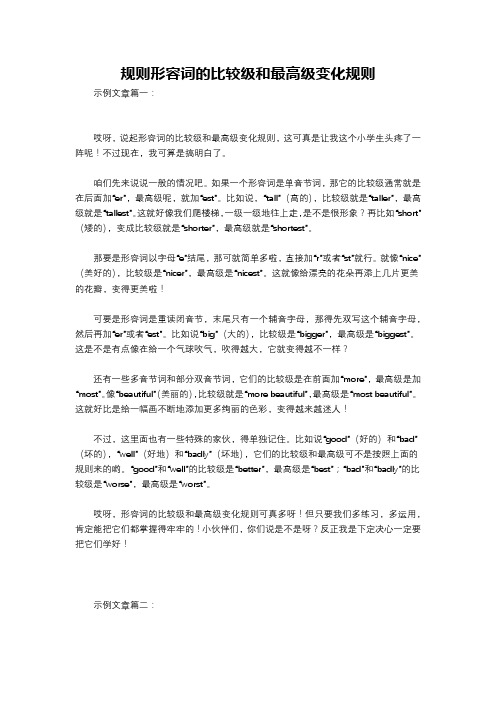
规则形容词的比较级和最高级变化规则示例文章篇一:哎呀,说起形容词的比较级和最高级变化规则,这可真是让我这个小学生头疼了一阵呢!不过现在,我可算是搞明白了。
咱们先来说说一般的情况吧。
如果一个形容词是单音节词,那它的比较级通常就是在后面加“er”,最高级呢,就加“est”。
比如说,“tall”(高的),比较级就是“taller”,最高级就是“tallest”。
这就好像我们爬楼梯,一级一级地往上走,是不是很形象?再比如“short”(矮的),变成比较级就是“shorter”,最高级就是“shortest”。
那要是形容词以字母“e”结尾,那可就简单多啦,直接加“r”或者“st”就行。
就像“nice”(美好的),比较级是“nicer”,最高级是“nicest”。
这就像给漂亮的花朵再添上几片更美的花瓣,变得更美啦!可要是形容词是重读闭音节,末尾只有一个辅音字母,那得先双写这个辅音字母,然后再加“er”或者“est”。
比如说“big”(大的),比较级是“bigger”,最高级是“biggest”。
这是不是有点像在给一个气球吹气,吹得越大,它就变得越不一样?还有一些多音节词和部分双音节词,它们的比较级是在前面加“more”,最高级是加“most”。
像“beautiful”(美丽的),比较级就是“more beautiful”,最高级是“most beautiful”。
这就好比是给一幅画不断地添加更多绚丽的色彩,变得越来越迷人!不过,这里面也有一些特殊的家伙,得单独记住。
比如说“good”(好的)和“bad”(坏的),“well”(好地)和“badly”(坏地),它们的比较级和最高级可不是按照上面的规则来的哟。
“good”和“well”的比较级是“better”,最高级是“best”;“bad”和“badly”的比较级是“worse”,最高级是“worst”。
哎呀,形容词的比较级和最高级变化规则可真多呀!但只要我们多练习,多运用,肯定能把它们都掌握得牢牢的!小伙伴们,你们说是不是呀?反正我是下定决心一定要把它们学好!示例文章篇二:哎呀呀,同学们,今天咱们来聊聊形容词的比较级和最高级的变化规则,这可有意思啦!比如说,一般情况下,咱们直接在形容词后面加“er”就变成比较级,加“est”就变成最高级。
小学六年级英语初步了解形容词比较级和最高级的句型结构

成龙是中国最著名的人物之一。
Shangh…aiiiss oonnee ooffththeeb…iggiens…t cities in China.
上海是中国最大的城市之一。
…Yaiosmoinnge iosfotnheeo…f thine…
e.g. Kevin is the taller of the two boys. Kevin是两个男孩中比较高的。 Bob is the shorter of the two boys. Bob是两个男孩中比较矮的。
Bob
Kevin
e.g. The green ball is the smaller of the two balls. 绿色的球是两个球中比较小的。
big
small
Yoyo Coco
Ale…x iiss tthhee t…hinnoef rthoef thtweotw…o boys. To…misis tthhee f…atteorf othf tehetwtwoo…boys.
thin
fat
Alex Tom
【拓展】最高级的其他表达方式:
1.“主语+ be + one of the+形容词最高级+复数名词+in/of短语”表 示“…是…中最…之一”
A
B
C
bigger the biggestb..i.g. …B is b…igtghearnth…an A.
…C is the …big.gest.
fatter fat
the fattest
T…heisca..t. is fat. T…heisdo…g tihsafantt…er than the cat. T…heisptahned…a i.s the fattest.
小学英语常见形容词及比较级、最高级变化一览表

小学英语常见形容词及比较级、最高级变化一览表第一篇:小学英语常见形容词及比较级、最高级变化一览表小学英语常见形容词及比较级、最高级变化一览表1.在形容词词尾加上“er” “est” 构成比较级、最高级:bright(明亮的)—brighter—brightestbroad(广阔的)—broader—broadestcheap(便宜的)—cheaper—cheapestclean(干净的)—cleaner—cleanestclever(聪明的)—cleverer—cleverestcold(寒冷的)—colder—coldestcool(凉的)—cooler—coolestdear(贵的)—dearer—dearestfast(迅速的)—faster—fastestgreat(伟大的)—greater—greatesthigh(高的)—higher—highestlight(轻的)—lighter—lightestloud(响亮的)—louder—loudestnear(近的)—nearer—nearestpoor(穷的)—poorer—poorestquiet(安静的)—quieter—quietestshort(短的)—shorter—shortestsmall(小的)—smaller—smallestsoft(柔软的)—softer—softestsweet(甜的)—sweeter—sweetestthick(厚的)—thicker—thickestweak(弱的)—weaker—weakestdark(黑暗的)—darker—darkestdeep(深的)—deeper—deepestfew(少的)—fewer—fewesthard(困难的,硬的)—harder—hardestkind(善良的)—kinder—kindestlong(长的)—longer—longestlow(低的)—lower—lowestnew(新的)—newer—newestquick(快的)—quicker—quickestrich(富裕的)—richer—richestslow(慢的)—slower—slowestsmart(聪明的)—smarter—smarteststrong(强壮的)—stronger—strongesttall(高的)-taller-tallestwarm(温暖的)—warmer—warmestyoung(年轻的)—younger—youngest2.双写最后一个字母,再加上“er” “est” 构成比较级、最高级:big(大的)—bigger—biggestfat(胖的)—fatter—fattesthot(热的)—hotter—hottestred(红的)—redder—reddestsad(伤心的)—sadder—saddestthin(瘦的)—thinner—thinnestwet(湿的)—wetter—wettestmad(疯的)—madder—maddest3.以不发音的字母e结尾的形容词,加上“r” “st” 构成比较级、最高级:able(能干的)—abler—ablestbrave(勇敢的)—braver—bravestclose(接近的)—closer—closestfine(好的,完美的)—finer—finestlarge(巨大的)—larger—largestlate(迟的)—later—latestnice(好的)—nicer—nicestripe(成熟的)—riper—ripestrude(粗鲁的)—ruder—rudestsafe(安全的)—safer—safeststrange(奇怪的)—stranger—strangestwide(宽广的)—wider—widestwise(睿智的,聪明的)—wiser—wisestwhite(白的)—whiter—whitest4.以字母y结尾的形容词,把y改为i,再加上“er” “est” 构成比较级、最高级:busy(忙碌的)—busier—busiestdirty(脏的)—dirtier—dirtiestdry(干燥的)—drier—driestearly(早的)—earlier—earliesteasy(容易的)—easier—easiestfriendly(友好的)—friendlier—friendliestfunny(好玩的)—funnier—funniesthappy(开心的)—happier—happiesthealthy(健康的)—healthier—healthiestheavy(重的)—heavier—heaviesthungry(饿的)—hungrier—hungriestlazy(懒惰的)—lazier—laziestlucky(幸运的)—luckier—luckiestnaughty(调皮的)—naughtier—naughtiestnoisy(嘈杂的)—noisier—noisiestpretty(美丽的)—prettier—prettiestsilly(傻的)—sillier—silliestspicy(辣的)—spicier—spiciestthirsty(渴的)—thirstier—thirstiestugly(丑的)—uglier—ugliest5.双音节、多音节形容词,在单词前面加上“more” “most” 构成比较级、最高级:afraid(害怕的)—more afraid—most afraidbeautiful(美丽的)—more beautiful—most beautiful careful (仔细的)—more careful—most carefulcheerful(开心的)—more cheerful—most cheerfulcrowded(拥挤的)—more crowded—most crowdeddangerous(危险的)—more dangerous—most dangerous delicious(美味的)—more delicious—most deliciousdifficult(困难的)—more difficult—most difficultexciting(令人兴奋的)—more exciting—most excitingexpensive(昂贵的)—more expensive—most expensive famous(著名的)—more famous—most famousfrightened(受惊的)—more frightened—most frightened frightening(令人害怕的)—more frightening—most frightening hard-working(勤奋的)—more hard-working—most hard-workinghelpful(有帮助的)—more helpful—most helpfulhonest(诚实的)—more honest—most honestimportant(重要的)—more important—most important interesting(有趣的)—more interesting—most interesting polite(有礼貌的)—more polite—most politeterrible(可怕的)—more terrible—most terribletired(累的)—more tired—most tired6.不规则变化的形容词:bad(坏的)—worse—worstfar(远的)—farther—farthest(far—further—furthest)good(好的)—better—bestill(病的)—worse—worstlittle(少的)—less—leastmany(多的)—more—mostmuch(多的)—more—mostold(年老的)—older—oldest(old—elder—eldest)well(好的,身体好的)—better—best1.一般在词尾直接加er或est, 例如,tall-taller-tallest,long-longer-longest2.以不发音的字母e结尾的单词在词尾直接加r或st, 例如,nice-nicer-nicest3.以辅音字母+y结尾的词,把y变为i,再加er 或est, 例如,heavy-heavier-heaviest4.重读闭音节,末尾只有一个辅音字母,双写这个辅音字母,再加er或est, 例如,big-bigger-biggest5.部分双音节词和多音节词分别在原级前加more构成比较级和most构成最高级, 例如,slowly-more slowly-most slowly;beautiful-more beautiful-most beautiful一、形容词、副词的比较级和最高级的构成规则1.一般单音节词和少数以-er,-ow结尾的双音节词,比较级在后面加-er,最高级在后面加-est;(1)单音节词如:small→smaller→smallest short→shorter→shortest tall→taller→tallest great→greater→great est(2)双音节词如:clever→cleverer→cleverest narrow→narrower→narrowest 2.以不发音e结尾的单音节词,比较在原级后加-r,最高级在原级后加-st;如:large→larger→largest nice→nicer→nicest able→abler→ablest 3.在重读闭音节(即:辅音+元音+辅音)中,先双写末尾的辅音字母,比较级加-er,最高级加-est;如:big→bigger→biggest hot→hotter→hottest fat→fatter→fattest 4.以“辅音字母+y”结尾的双音节词, 把y改为i,比较级加-er,最高级加-est;如:easy→easier→easiest heavy→heavier→heaviest busy→busier→busiest happy→happier→happiest 5.其他双音节词和多音节词,比较级在前面加more,最高级在前面加most;如:beautiful→morebeautiful→most beautiful different→more different→mo st different easily→more easily→most easily 注意:(1)形容词最高级前通常必须用定冠词 the,副词最高级前可不用.例句: The Sahara is the biggest desert in the world.(2)形容词most前面没有the,不表示最高级的含义,只表示“非常”.It is a most important problem.=It is a very important problem.6.有少数形容词、副词的比较级和最高级是不规则的,必须熟记.如:good→better→best well→better→best bad→worse→worst ill→worse→worst old→older/elder→oldest/eldest many/much→more→most little→less→least far →further/farther→ furthest/farthest二、形容词、副词的比较级和最高级的用法1.“A + be +形容词比较级+ than + B” 意思为“A比B更……”.如:This tree is taller than that one.这棵树比那棵树高.注意:① 在含有连词than的比较级中,前后的比较对象必须是同一范畴,即同类事物之间的比较.②在比较级前面使用much,表示程度程度“强得多”.如:A watermelon is much bigger than an apple.③ very, quite一般只能修饰原级,不能修饰比较级.2.“比较级 + and + 比较级”或“more and more +原级”表示“越来越……” 如:It becomes warmer and warmer when spring comes.春天来了,天气变得越来越暖和了.It is getting cooler and cooler.天气越来越凉爽.The wind became more and more heavily.风变得越来越大.Our school is becoming more and more beautiful.我们的学校变得越来越美丽.3.在含有or的选择疑问句中,如果有两者供选择,前面的形容词要用比较级形式.如:Who is taller,Tim or T om? 谁更高,Tim还是Tom?4.“the +比较级……, the+比较级”,表示“越……越……”.The more money you make, the more you spend.钱你赚得越多,花得越多.The sooner,the better.越快越好.5.表示倍数的比较级用法:①.A is …times the size /height/length/width of B.如:The new building is three times the height of the old one.这座新楼比那座旧楼高三倍.(新楼是旧楼的四倍高)②.A is …times as big/high/long/wide/large as B.如:Asia is four times as large as Europe.亚洲是欧洲的四倍大.(亚洲比欧洲大三倍)③.A is …times larger /higher/longer/wider than B.如:Our school is twice bigger than yours.我们学校比你们学校大两倍.6.形容词、副词的最高级形式主要用来表示三者或三者以上人或事物的比较,表示“最……”的意思.句子中有表示范围的词或短语.如:of the three, in our class等等.如:He is the tallest in our class.他在我们班里是最高的.7.“否定词语+比较级”,“否定词语+ so… as”结构表示最高级含义.Nothing is so easy as this.=Nothing is easier than this.=This is the easiest thing.8.比较级与最高级的转换: Mike is the most intelligent in his class.Mike is more intelligent than any other student in his class 7.修饰比较级和最高级的词 1)可修饰比较级的词①.a bit, a little, rather, much, far, by far, many, a lot, lots, a great deal, any, still, even等.②.还可以用表示倍数的词或度量名词作修饰语.③.以上词(除by far)外,必须置于比较级形容词或副词的前面.注意:使用最高级要注意将主语包括在比较范围内.(错)Tom is the tallest of his three brothers.(对)Tom is the tallest of the three brothers.2)下列词可修饰最高级:by far, far, much, mostly, almost.This hat is nearly / almost the biggest.注意:a.very可修饰最高级,但位置与much不同.This is the very best.This is much the best.b.序数词通常只修饰最高级.Africa is the second largest continent.8.要避免重复使用比较级.(错)He is more cleverer than his brother.(对)He is more clever than his brother.(对)He is cleverer than his brother.9.要避免将主语含在比较对象中.(错)China is larger that any country in Asia.(对)China is larger than any other country in Asia.10.要注意对应句型,遵循前后一致的原则.The population of Shanghai is larger than that of Beijing.It is easier to make a plan than to carry it out.11.要注意冠词的使用,后有名词的时候,前面才有可能有名词.比较:Which is larger, Canada or Australia? Which is the larger country, Canada orAustralia? She is taller than her two sisters.She is the taller of the two sisters.第二篇:小学常见形容词比较级和最高级小学常见形容词比较级和最高级I.记忆口诀形容词的比较级,一好一坏要记牢;good更好是better,坏的更坏是worse;结尾有e只加r, nice变成nicer;若是遇到 y 结尾,把 y 变 i 加er;其余全部加er.(注:虽然口诀并不能涵盖所有形容词比较级变化的方式,但也是一个不错的记忆小窍门。
小学形容词的比较级和最高级ppt课件
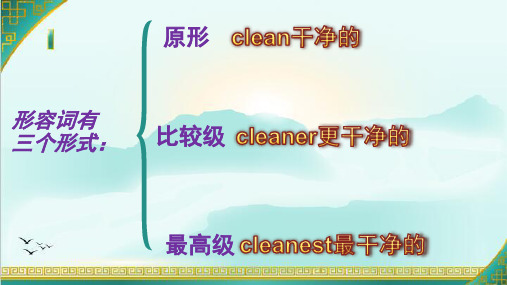
谢谢大家
2. 比较级的用法:用于二者的比较
• 结构:比较级+than,意为“比......更......”。
Sam is taller than Jim. This picture is more beautiful than that one.
3. 最高级的用法:用于3者或以上的比较
• 结构:the+最高级+比较范围,意为“最......”。
Peter is taller than Jim.
3.直尺比铅笔长。
Ruler is longer than pencil.
4.铅笔比直尺短。
Pencil is shorter than ruler.
5. 兔子比乌龟慢。
Rabbit is quicker than turtle.
6.Tony比Lucy强壮。
最高级:y变i+est
比较级和最高级变化规则(4):
4. 以重读闭音节 结尾,而且只有 一个辅音字母的 单词:
比较级:双写辅音字母+er
big-bigger-biggiest hot-hotter-hottiest
最高级:双写辅音字母+est
比较级和最高级变化规则(5):
5. 由两个或两个 以上音节构成的 单词:
Tony is stronger than Lucy.
7.老虎比小狗大。
Tiger is bigger than dog.
8.吉普车比自行车快。
Jeep is quicker than bike.
9. 迈克是班里最聪明的男孩。
Mike is the cleverest boy in the class.
10.玛丽是家里最快乐的孩子。
小学形容词比较级和最高级(共5篇)
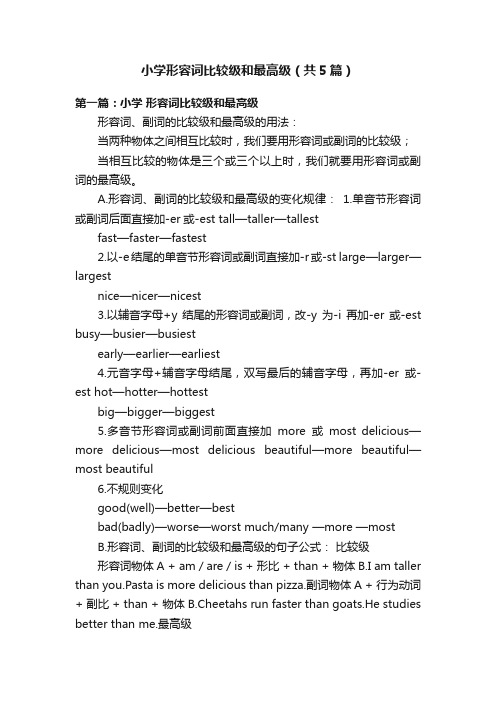
小学形容词比较级和最高级(共5篇)第一篇:小学形容词比较级和最高级形容词、副词的比较级和最高级的用法:当两种物体之间相互比较时,我们要用形容词或副词的比较级;当相互比较的物体是三个或三个以上时,我们就要用形容词或副词的最高级。
A.形容词、副词的比较级和最高级的变化规律:1.单音节形容词或副词后面直接加-er或-est tall—taller—tallestfast—faster—fastest2.以-e结尾的单音节形容词或副词直接加-r或-st large—larger—largestnice—nicer—nicest3.以辅音字母+y结尾的形容词或副词,改-y为-i再加-er或-est busy—busier—busiestearly—earlier—earliest4.元音字母+辅音字母结尾,双写最后的辅音字母,再加-er或-est hot—hotter—hottestbig—bigger—biggest5.多音节形容词或副词前面直接加more或most delicious—more delicious—most delicious beautiful—more beautiful—most beautiful6.不规则变化good(well)—better—bestbad(badly)—worse—worst much/many —more —mostB.形容词、副词的比较级和最高级的句子公式:比较级形容词物体A + am / are / is + 形比 + than + 物体B.I am taller than you.Pasta is more delicious than pizza.副词物体A + 行为动词+ 副比 + than + 物体B.Cheetahs run faster than goats.He studies better than me.最高级1)物体A + am / are / is + the + 形最高级 + 比较范围(of + 人/物,in +地方).I am the tallest in the class.Pasta is the most delicious food of the three.2)物体A + 行为动词 + 副词最高级 + 比较范围(of + 人/物,in + 地方).Cheetahs run fastest in the world.He studies best of us.一.词形变换。
小学英语常用形容词比较级和最高级一览表(表格形式)
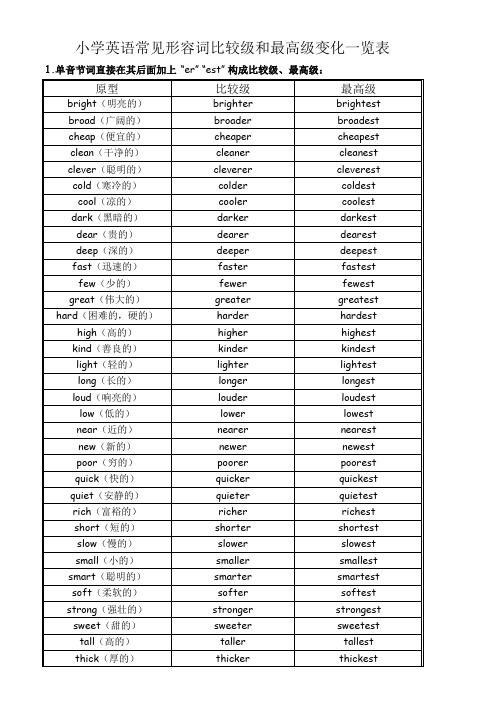
fast(迅速的)
faster
fastest
few(少的)
fewer
fewest
great(伟大的)
greater
greatest
hard(困难的,硬的)
harder
hardest
high(高的)
higher
highest
kind(善良的)
kinder
kindest
light(轻的)
lighter
lightest
silly(傻的) spicy(辣的) thirsty(渴的) ugly(丑的) 5.双音节、多音节形容词, 在单词前面加上 “more” “
原型
afraid(害怕的) beautiful(美丽的) careful(仔细的) cheerful(开心的) crowded(拥挤的) dangerous(危险的) delicious(美味的) difficult(困难的) exciting(令人兴奋的) expensive(昂贵的) famous(著名的) frightened(受惊的) frightening(令人害怕的) hard-working(勤奋的) helpful(有帮助的)
close(接近的) cute(可爱的) fine(好的,完美的) large(巨大的)
late(迟的)
closer cuter finer larger later
closest cutest finest largest latest
nice(好的) ripe(成熟的) rude(粗鲁的) safe(安全的) strange(奇怪的)
quieter
quietest
rich(富裕的)
richer
小学英语常见形容词及比较级、最高级变化一览表
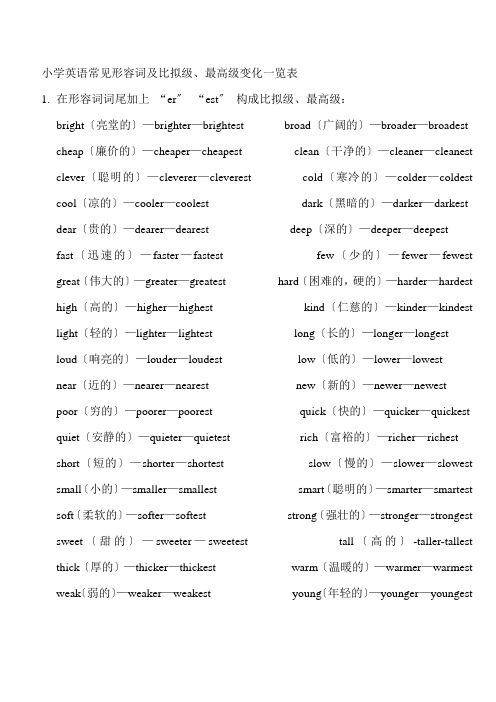
小学英语常见形容词及比拟级、最高级变化一览表1.在形容词词尾加上“er〞“est〞构成比拟级、最高级:bright〔亮堂的〕—brighter—brightest broad〔广阔的〕—broader—broadest cheap〔廉价的〕—cheaper—cheapest clean〔干净的〕—cleaner—cleanest clever〔聪明的〕—cleverer—cleverest cold〔寒冷的〕—colder—coldest cool〔凉的〕—cooler—coolest dark〔黑暗的〕—darker—darkest dear〔贵的〕—dearer—dearest deep〔深的〕—deeper—deepest fast〔迅速的〕—faster—fastest few〔少的〕—fewer—fewest great〔伟大的〕—greater—greatest hard〔困难的,硬的〕—harder—hardest high〔高的〕—higher—highest kind〔仁慈的〕—kinder—kindest light〔轻的〕—lighter—lightest long〔长的〕—longer—longest loud〔响亮的〕—louder—loudest low〔低的〕—lower—lowestnear〔近的〕—nearer—nearest new〔新的〕—newer—newest poor〔穷的〕—poorer—poorest quick〔快的〕—quicker—quickest quiet〔安静的〕—quieter—quietest rich〔富裕的〕—richer—richest short〔短的〕—shorter—shortest slow〔慢的〕—slower—slowest small〔小的〕—smaller—smallest smart〔聪明的〕—smarter—smartest soft〔柔软的〕—softer—softest strong〔强壮的〕—stronger—strongest sweet〔甜的〕—sweeter—sweetest tall〔高的〕-taller-tallest thick〔厚的〕—thicker—thickest warm〔温暖的〕—warmer—warmest weak〔弱的〕—weaker—weakest young〔年轻的〕—younger—youngest2.双写最后一个字母,再加上“er〞“est〞构成比拟级、最高级:big〔大的〕—bigger—biggest fat〔胖的〕—fatter—fattesthot〔热的〕—hotter—hottest red〔红的〕—redder—reddestsad〔伤心的〕—sadder—saddest thin〔瘦的〕—thinner—thinnestwet〔湿的〕—wetter—wettest mad〔疯的〕—madder—maddest3.以不发音的字母e结尾的形容词,加上“r〞“st〞构成比拟级、最高级:able〔能干的〕—abler—ablest brave〔英勇的〕—braver—bravest close〔接近的〕—closer—closest fine〔好的,完美的〕—finer—finest large〔宏大的〕—larger—largest late〔迟的〕—later—latest nice〔好的〕—nicer—nicest ripe〔成熟的〕—riper—ripest rude〔粗鲁的〕—ruder—rudest safe〔平安的〕—safer—safest strange〔奇怪的〕—stranger—strangest wide〔宽广的〕—wider—widest wise〔睿智的,聪明的〕—wiser—wisest white〔白的〕—whiter—whitest4.以字母y结尾的形容词,把y改为i,再加上“er〞“est〞构成比拟级、最高级:busy〔繁忙的〕—busier—busiest dirty〔脏的〕—dirtier—dirtiest dry〔枯燥的〕—drier—driest early〔早的〕—earlier—earliest easy〔容易的〕—easier—easiest friendly〔友好的〕—friendlier—friendliest funny〔好玩的〕—funnier—funniest happy〔开心的〕—happier—happiest healthy〔安康的〕—healthier—healthiest heavy〔重的〕—heavier—heaviest hungry〔饿的〕—hungrier—hungriest lazy〔懒惰的〕—lazier—laziest lucky〔幸运的〕—luckier—luckiest naughty〔淘气的〕—naughtier—naughtiestnoisy〔嘈杂的〕—noisier—noisiest pretty〔美丽的〕—prettier—prettiest silly〔傻的〕—sillier—silliest spicy〔辣的〕—spicier—spiciest thirsty〔渴的〕—thirstier—thirstiest ugly〔丑的〕—uglier—ugliest5.双音节、多音节形容词,在单词前面加上“more〞“most〞构成比拟级、最高级:afraid〔害怕的〕—more afraid—most afraid beautiful〔美丽的〕—more beautiful —most beautiful careful〔仔细的〕—more careful—most careful cheerful〔开心的〕—more cheerful—most cheerful crowded〔拥挤的〕—more crowded—most crowded dangerous〔危险的〕—more dangerous—most dangerous delicious〔美味的〕—more delicious—most delicious difficult〔困难的〕—more difficult—most difficult exciting〔令人兴奋的〕—more exciting—most exciting expensive〔昂贵的〕—more expensive—most expensive famous〔著名的〕—more famous—most famous frightened〔受惊的〕—more frightened—most frightened frightening 〔令人害怕的〕—more frightening—most frightening hard-working〔勤奋的〕—more hard-working—most hard-working helpful〔有帮助的〕—more helpful—most helpful honest〔老实的〕—more honest—most honest important〔重要的〕—more important—most important interesting〔有趣的〕—more interesting—most interesting polite〔有礼貌的〕—more polite—most polite terrible〔可怕的〕—more terrible—most terrible tired〔累的〕—more tired—most tired6.不规那么变化的形容词:bad〔坏的〕—worse—worst far〔远的〕—farther—farthest (far—further—furthest) good〔好的〕—better—best ill〔病的〕—worse—worstlittle〔少的〕—less—least many〔多的〕—more—mostmuch〔多的〕—more—most old〔年老的〕—older—oldest ( old—elder—eldest) well〔好的,身体好的〕—better—best1.一般在词尾直接加er或est,例如,tall-taller-tallest,long-longer-longest2.以不发音的字母e结尾的单词在词尾直接加r或st,例如,nice-nicer-nicest3.以辅音字母+y结尾的词,把y变为i,再加er或est,例如,heavy-heavier-heaviest4.重读闭音节,末尾只有一个辅音字母,双写这个辅音字母,再加er或est,例如,big-bigger-biggest5.局部双音节词和多音节词分别在原级前加more构成比拟级和most构成最高级, 例如,slowly-more slowly-most slowly;beautiful-more beautiful-most beautiful一、形容词、副词的比拟级和最高级的构成规那么1.一般单音节词和少数以-er,-ow结尾的双音节词,比拟级在后面加-er,最高级在后面加-est;〔1〕单音节词如:small→smaller→smallest short→shorter→shortesttall→taller→tallest great→greater→greatest〔2〕双音节词如:clever→cleverer→cleverest narrow→narrower→narrowest2.以不发音e结尾的单音节词,比拟在原级后加-r,最高级在原级后加-st;如:large→larger→largest nice→nicer→nicest able→abler→ablest3.在重读闭音节〔即:辅音+元音+辅音〕中,先双写末尾的辅音字母,比拟级加-er,最高级加-est;如:big→bigger→biggest hot→hotter→hottest fat→fatter→fattest4.以“辅音字母+y〞结尾的双音节词, 把y改为i,比拟级加-er,最高级加-est;如:easy→easier→easiest heavy→heavier→heaviestbusy→busier→busiest happy→happier→happiest5.其他双音节词和多音节词,比拟级在前面加more,最高级在前面加most;如:beautiful→more beautiful→most beautifuldifferent→more different→most differenteasily→more easily→most easily注意:〔1〕形容词最高级前通常必须用定冠词the,副词最高级前可不用.例句:The Sahara is the biggest desert in the world.〔2〕形容词most前面没有the,不表示最高级的含义,只表示"非常".It is a most important problem.=It is a very important problem.6.有少数形容词、副词的比拟级和最高级是不规那么的,必须熟记.如:good→better→best well→better→bestbad→worse→worst ill→worse→worstold→older/elder→oldest/eldestmany/much→more→most little→less→leastfar →further/farther→furthest/farthest二、形容词、副词的比拟级和最高级的用法1.“A + be +形容词比拟级+ than + B〞意思为“A比B更……〞.如:This tree is taller than that one. 这棵树比那棵树高.注意:①在含有连词than的比拟级中,前后的比拟对象必须是同一范畴,即同类事物之间的比拟.②在比拟级前面使用much,表示程度程度“强得多〞.如:A watermelon is much bigger than an apple.③very, quite一般只能修饰原级,不能修饰比拟级.2.“比拟级+ and + 比拟级〞或“more and more +原级〞表示“越来越……〞如:It becomes warmer and warmer when spring comes.春天来了,天气变得越来越暖和了.It is getting cooler and cooler.天气越来越凉快.The wind became more and more heavily.风变得越来越大.Our school is becoming more and more beautiful.我们的学校变得越来越美丽.3.在含有or的选择疑问句中,假如有两者供选择,前面的形容词要用比拟级形式. 如:Who is taller,Tim or Tom? 谁更高,Tim还是Tom?4. “the +比拟级……, the+比拟级〞,表示“越……越……〞.The more money you make, the more you spend.钱你赚得越多,花得越多.The sooner,the better.越快越好.5. 表示倍数的比拟级用法:①. A is …times the size /height/length/width of B.如:The new building is three times the height of the old one.这座新楼比那座旧楼高三倍.(新楼是旧楼的四倍高)②. A is …times as big /high/long/wide/large as B.如:Asia is four times as large as Europe.亚洲是欧洲的四倍大.(亚洲比欧洲大三倍)③. A is …times larger /higher/longer/wider than B.如:Our school is twice bigger than yours.我们学校比你们学校大两倍.6.形容词、副词的最高级形式主要用来表示三者或三者以上人或事物的比拟,表示“最……〞的意思.句子中有表示范围的词或短语.如:of the three, in our class等等.如:He is the tallest in our class.他在我们班里是最高的.7."否认词语+比拟级","否认词语+ so…as"构造表示最高级含义.Nothing is so easy as this.=Nothing is easier than this.=This is the easiest thing.8. 比拟级与最高级的转换:Mike is the most intelligent in his class.Mike is more intelligent than any other student in his class1〕可修饰比拟级的词①.a bit, a little, rather, much, far, by far, many, a lot, lots, a great deal, any, still, even等.②. 还可以用表示倍数的词或度量名词作修饰语.③. 以上词(除by far)外,必须置于比拟级形容词或副词的前面.注意:使用最高级要注意将主语包括在比拟范围内.(错) Tom is the tallest of his three brothers.(对) Tom is the tallest of the three brothers.2)以下词可修饰最高级:by far, far, much, mostly, almost.This hat is nearly / almost the biggest.注意:a. very可修饰最高级,但位置与much不同.This is the very best.This is much the best.b. 序数词通常只修饰最高级.Africa is the second largest continent.8.要防止重复使用比拟级.(错) He is more cleverer than his brother.(对) He is more clever than his brother.(对) He is cleverer than his brother.9.要防止将主语含在比拟对象中.(错) China is larger that any country in Asia.(对) China is larger than any other country in Asia.10.要注意对应句型,遵循前后一致的原那么.The population of Shanghai is larger than that of Beijing.It is easier to make a plan than to carry it out.11.要注意冠词的使用,后有名词的时候,前面才有可能有名词. 比拟:Which is larger, Canada or Australia?Which is the larger country, Canada or Australia?She is taller than her two sisters.She is the taller of the two sisters.。
形容词的比较级和最高级
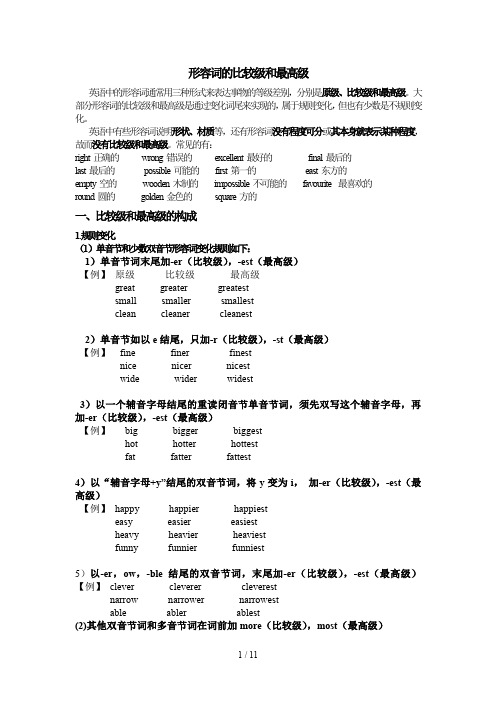
形容词的比较级和最高级英语中的形容词通常用三种形式来表达事物的等级差别,分别是原级、比较级和最高级。
大部分形容词的比较级和最高级是通过变化词尾来实现的,属于规则变化,但也有少数是不规则变化。
英语中有些形容词说明形状、材质等,还有形容词没有程度可分或其本身就表示某种程度,故而没有比较级和最高级。
常见的有:right 正确的 wrong 错误的 excellent 最好的 final 最后的last 最后的 possible 可能的 first 第一的 east 东方的empty 空的 wooden 木制的 impossible 不可能的 favourite 最喜欢的round 圆的 golden 金色的 square 方的一、比较级和最高级的构成1.规则变化(1)单音节和少数双音节形容词变化规则如下:1)单音节词末尾加-er(比较级),-est(最高级)【例】原级比较级最高级great greater greatestsmall smaller smallestclean cleaner cleanest2)单音节如以e结尾,只加-r(比较级),-st(最高级)【例】fine finer finestnice nicer nicestwide wider widest3)以一个辅音字母结尾的重读闭音节单音节词,须先双写这个辅音字母,再加-er(比较级),-est(最高级)【例】big bigger biggesthot hotter hottestfat fatter fattest4)以“辅音字母+y”结尾的双音节词,将y变为i,加-er(比较级),-est(最高级)【例】happy happier happiesteasy easier easiestheavy heavier heaviestfunny funnier funniest5)以-er,ow,-ble结尾的双音节词,末尾加-er(比较级),-est(最高级)【例】clever cleverer cleverestnarrow narrower narrowestable abler ablest(2)其他双音节词和多音节词在词前加more(比较级),most(最高级)【例】tired more tired most tiredinteresting more interesting most interestingdifficult more difficult most difficult(注意:A:有词根加ly构成的形容词,在词前加more(比较级),most(最高级)如friendly----friend+ly构成, friendly more friendly most friendly;B:以形容前缀un构成的三音节形容词不适合上述情况,如unhappy----unhappier----unhappiest,untidy----untidier----untidiest )2.不规则变化形容词的不规则变化如下:原级比较级最高级good/well better bestbad/ill worse worstlittle/ few less leastmuch/many more mostfar farther更远的(只指距离)further 更远的(指距离);更深入的(指程度)farthest; furthestold older 较老的,较旧的;长辈的(指年龄、新旧、血缘);elder长辈的(只指血缘)oldest; eldest二、比较级的用法(1)高于或低于另一方的比较运用“比较级+than”的结构可以表达一方超过或低于另一方的情况。
(完整版)常见形容词比较级最高级变化一览表
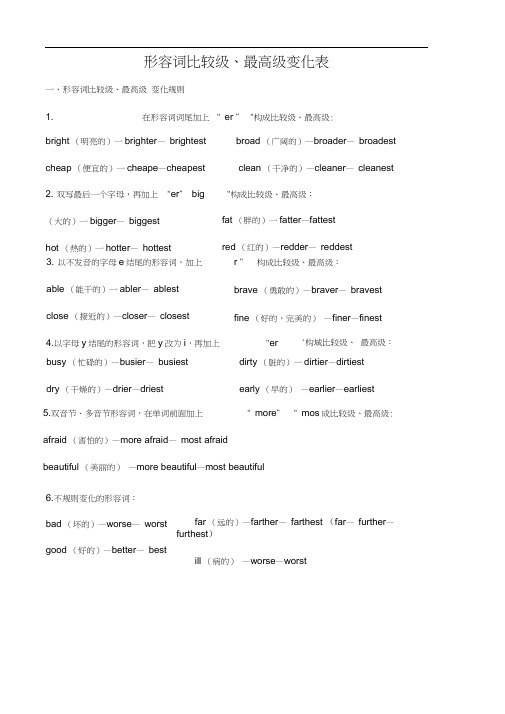
形容词比较级、最高级变化表一、形容词比较级、最高级 变化规则1. 在形容词词尾加上 “ er ” “构成比较级、最高级:bright (明亮的)一brighter — brightestcheap (便宜的)一cheape —cheapest2. 双写最后一个字母,再加上 “er ” big(大的)一bigger — biggest hot (热的)一hotter — hottest broad (广阔的)—broader — broadest clean (干净的)—cleaner — cleanest “构成比较级、最高级: fat (胖的)一fatter —fattestred (红的)—redder — reddest3. 以不发音的字母e 结尾的形容词,加上 able (能干的)一abler — ablest close (接近的)—closer — closest r ” 构成比较级、最高级:brave (勇敢的)—braver — bravestfine (好的,完美的) —finer —finestbusy (忙碌的)—busier — busiestdry (干燥的)—drier —driestdirty (脏的)一dirtier —dirtiest early (早的) —earlier —earliest5.双音节、多音节形容词,在单词前面加上“ more ” “ mos 成比较级、最高级: afraid (害怕的)—more afraid — most afraidbeautiful (美丽的) —more beautiful —most beautifulfar (远的)—farther — farthest (far — further —furthest )ill (病的) —worse —worst 4.以字母y 结尾的形容词,把y 改为i ,再加上“er '构城比较级、 最高级: 6.不规则变化的形容词:bad (坏的)—worse — worstgood (好的)—better — best二、形容词比较级和最高级句型(特殊)比较级句型:1. 在形容词比较级前还可以用much, eve n, still, a little, ......... 来修饰,表示“...... 的多” 甚至 .... ” 更...... ”“.. 一些”Our city is much more beautiful than yours.我们的城市比你们的漂亮得多。
PEP小学英语常见形容词及比较级、最高级变化一览表

PEP小学英语常见形容词及比较级、最高级变化一览表1.在形容词词尾加上“er” “est” 构成比较级、最高级:bright(明亮的)—brighter—brightest broad(广阔的)—broader—broadest cheap(便宜的)—cheaper—cheapest clean(干净的)—cleaner—cleanest clever(聪明的)—cleverer—cleverest cold(寒冷的)—colder—coldest cool(凉的)—cooler—coolest dark(黑暗的)—darker—darkest dear(贵的)—dearer—dearest deep(深的)—deeper—deepest fast(迅速的)—faster—fastest few(少的)—fewer—fewestgreat(伟大的)—greater—greatest hard(困难的,硬的)—harder—hardest high(高的)—higher—highest kind(善良的)—kinder—kindest light(轻的)—lighter—lightest long(长的)—longer—longest loud(响亮的)—louder—loudest low(低的)—lower—lowest near(近的)—nearer—nearest new(新的)—newer—newest poor(穷的)—poorer—poorest quick(快的)—quicker—quickest quiet(安静的)—quieter—quietest rich(富裕的)—richer—richest short(短的)—shorter—shortest slow(慢的)—slower—slowest small(小的)—smaller—smallest smart(聪明的)—smarter—smartest soft(柔软的)—softer—softest strong(强壮的)—stronger—strongest sweet(甜的)—sweeter—sweetest tall(高的)-taller-tallestthick(厚的)—thicker—thickest warm(温暖的)—warmer—warmest weak(弱的)—weaker—weakest young(年轻的)—younger—youngest2.双写最后一个字母,再加上“er” “est”构成比较级、最高级:big(大的)—bigger—biggest fat(胖的)—fatter—fattesthot(热的)—hotter—hottest red(红的)—redder—reddestsad(伤心的)—sadder—saddest thin(瘦的)—thinner—thinnestwet(湿的)—wetter—wettest mad(疯的)—madder—maddest3.以不发音的字母e结尾的形容词,加上“r” “st” 构成比较级、最高级:able(能干的)—abler—ablest brave(勇敢的)—braver—bravest close(接近的)—closer—closest fine(好的,完美的)—finer—finest large(巨大的)—larger—largest late(迟的)—later—latestnice(好的)—nicer—nicest ripe(成熟的)—riper—ripest rude(粗鲁的)—ruder—rudest safe(安全的)—safer—safest strange(奇怪的)—stranger—strangest wide(宽广的)—wider—widest wise(睿智的,聪明的)—wiser—wisest white(白的)—whiter—whitest 4.以字母y结尾的形容词,把y改为i,再加上“er” “est”构成比较级、最高级:busy(忙碌的)—busier—busiest dirty(脏的)—dirtier—dirtiestdry(干燥的)—drier—driest early(早的)—earlier—earliest easy(容易的)—easier—easiest friendly(友好的)—friendlier—friendliest funny(好玩的)—funnier—funniest happy(开心的)—happier—happiest healthy(健康的)—healthier—healthiest heavy(重的)—heavier—heaviest hungry(饿的)—hungrier—hungriest lazy(懒惰的)—lazier—laziest lucky(幸运的)—luckier—luckiest naughty(调皮的)—naughtier—naughtiestnoisy(嘈杂的)—noisier—noisiest pretty(美丽的)—prettier—prettiest silly(傻的)—sillier—silliest spicy(辣的)—spicier—spiciest thirsty(渴的)—thirstier—thirstiest ugly(丑的)—uglier—ugliest5.双音节、多音节形容词,在单词前面加上“more” “most”构成比较级、最高级:afraid(害怕的)—more afraid—most afraidbeautiful(美丽的)—more beautiful—most beautifulcareful(仔细的)—more careful—most carefulcheerful(开心的)—more cheerful—most cheerfulcrowded(拥挤的)—more crowded—most crowdeddangerous(危险的)—more dangerous—most dangerousdelicious(美味的)—more delicious—most deliciousdifficult(困难的)—more difficult—most difficultexciting(令人兴奋的)—more exciting—most excitingexpensive(昂贵的)—more expensive—most expensivefamous(著名的)—more famous—most famousfrightened(受惊的)—more frightened—most frightenedfrightening(令人害怕的)—more frightening—most frighteninghard-working(勤奋的)—more hard-working—most hard-workinghelpful(有帮助的)—more helpful—most helpfulhonest(诚实的)—more honest—most honestimportant(重要的)—more important—most importantinteresting(有趣的)—more interesting—most interestingpolite(有礼貌的)—more polite—most politeterrible(可怕的)—more terrible—most terribletired(累的)—more tired—most tired6.不规则变化的形容词:bad(坏的)—worse—worst far(远的)—farther—farthest (far—further—furthest)good(好的)—better—best ill(病的)—worse—worstlittle(少的)—less—least many(多的)—more—most much(多的)—more—mostold(年老的)—older—oldest ( old—elder—eldest) well(好的,身体好的)—better—best。
- 1、下载文档前请自行甄别文档内容的完整性,平台不提供额外的编辑、内容补充、找答案等附加服务。
- 2、"仅部分预览"的文档,不可在线预览部分如存在完整性等问题,可反馈申请退款(可完整预览的文档不适用该条件!)。
- 3、如文档侵犯您的权益,请联系客服反馈,我们会尽快为您处理(人工客服工作时间:9:00-18:30)。
形容词的比较级和最高级一.形容词的比较级和最高级的用法在英语中,在表示两者作比较时,形容词要用特别的形式,称为“比较级”,三者及三者以上作比较时用“最高级”,原来的形容词称为“原级”。
e.g. You look taller than me .你比我高。
You are heavier than me.你比我重。
I am the strongest in my class. 我是我们班最强壮的。
二.形容词比较级和最高级句型结构1.比较级句型:主语A+ be 动词 + 形容词比较级 + than + B A……比B……e.g. He is older than me.他比我年长。
【拓展】比较级的其他表达方式①"the+形容词比较级+of the two+……"表示"...是两者中较…的"。
e.g. He is the heavier of the two boys.Look at the two boys. My brother is the taller of the two.②"比较级+and+比较级"表示"越来越……"。
e.g. He is getting taller and taller.他越来越高。
③"the+比较级,the+比较级"表示"越……越……"。
e.g. The more careful you are,the fewer mistakes you'll make你越细心,就会越少犯错误。
he more we get together, the happier we will be.我们聚得越多,我们就越开心The harder you work , the better you'll be.你越努力工作,你就会变得越好。
辅助练习:1. Jim is _______ than all the others. (tall)2. Things are getting _______ and _______. (bad)3. The higher you climb, the _______ it will be. (cold)2.最高级句型:主语 + be动词 + the + 形容词最高级 + 介词短语(介词短语:in my class ,in the room ,in the hall …)e.g. He is the tallest in our class.【拓展】最高级的其他形式①"主语+be+ one of the+形容词最高级+复数名词+in/of短语"表示"……是……中最……之一"e.g. Beijing is one of the largest cities in China.②序数词+最高级e.g. Hainan Island is the second largest island in China.辅助练习:1.The changjiang river is ____________________ (long) river in China.2. The Yellow River (Huang He) is ________________ (第二长)river in China3.A.形容词的比较级和最高级变化规则B. 部分双音节与多音节的词比较级在原级之前加more, 最高级在原级之前加most beautiful---more beautiful---most beautifulinteresting--- more interesting –most interestingdifficult--- more difficult – most difficultC.不规则变化的形容词:little / few - less – least good – better - bestbad/ill - worse – worst far -- farther/further—farthest/furthestmany/much – more – moste.g. 比较一下下列句子,领悟原级、比较级、最高级的用法。
Tom is tall.他很高。
Tom is as tall as John.汤姆和吉姆一样高。
Bob is taller than John.鲍勃比约翰高。
John is the tallest of the three.约翰是三个当中最高的一个。
John is the tallest in his class.约翰在他们班最高。
【课外拓展】1.在比较等级中常用much, a lot, far, even等常修饰比较级,表程度。
e.g.姚明比我高多了。
Yao Ming is very taller than I. (误)Yao Ming is much taller than I.(正)2.在比较等级的句型中,比较的双方必须是同类事物,否则会引起歧义。
即人与人,物与物的比较。
e.g. 他的尺子比我的长。
His ruler is longer than me.(误)His ruler is longer than mine.(正)3.形容词最高级前一般有定冠词,但如果前边也有物主代词,名词所有格等词来修饰时,定冠词the常被省略。
e.g.加里是我最好的朋友。
Gary is my the best friend. (误)Gary is my best friend. (正)4. 形容词比较级前一般不加定冠词,但句中有“of the two”结构表示“两者中较…的一个”时,定冠词the要加上。
e.g.苏珊是这两个女孩子当中较胖的一个。
Susan is fatter of the two girls. (误)Susan is the fatter of the two girls. (正)同步练习:一、选择题。
1. She is ________ than ________ .A. busier / usB. busier / weC. more busy / usD. more busy / we2. Jane is ________ than Betty.A. less tallerB. less tallestC. less tallD. not as tall3. China is ________ country in the world.A. the third largestB. the largest thirdC. the third largeD. a third largest4. -Which is ____ season in Beijing? -I think it's autumn.A. goodB. betterC.best D. the best5.- Which is__________ , the sun, the moon or the earth?-- Of course, the moon is.A. smallB. smallerC. smallestD. the smallest6.The air in Beijing is getting much _____ now than a few years ago.A. cleanB. cleanerC. cleanestD. the cleanest7. Mobile phones are very popular now and they are _____ than before.A. cheapB. cheaperC. cheapestD. the cheapes8.I study English as_______ as my brother.A. hardB. harderC. hardestD. the hardest9. Which is _____ , a bicycle or a computer?A. expensiveB. more expensiveC. the most expensiveD.expensiver10. The Yellow River is one of ______rivers in China.A. longB. longerC. the longestD. longest二、写出下列单词的比较级和最高级。
1. nice _________________________2. fat ______________________________3. slow _________________________4. dry _________________________________5. happy ________________________6. wet _________________________________7. much __________________________ 8. ill ________________________________9. little __________________________ 10. bad _____________________________三. 根据句意,用所括号内所级形容词的正确形式填空。
1. Mr. Smith is ____________ man in this office. (rich)2. Winter is _____________ season of the years. (cold)4. It is much _________ today than yesterday. (hot)5. She is a little ________ than her classmates. (careful)6. Bob is _________ ( young ) than Fred. but _________ (tall) than Fred.7. Almost all the students' faces are the same ,but Li Deming looks _______ (fat) than before after the summer holidays.8.Which is _________ (heavy), a duck or a chicken?9. An orange ia a little ______ (big) than an apple, but much ________ (sm all) than a watermelon.10.-- How _________ (tall) is Sally?--She' s 1.55 metres ________ (tall). What about Xiaoling?-- She' s only 1.40 metres ________ (tal)l) She is much _______ (short) than Sally.2) She is also the _______ (short) girl in the class.四、课堂总结:和学生一起,对本次课的主要内容作总结概括,并用红笔留痕。
